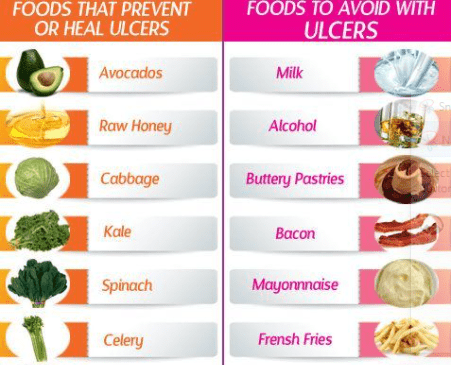Stomach ulcers (peptic ulcers) are sores that develop in the protective stomach lining. This type of peptic ulcer disease affects both the small intestines and stomach. Stomach ulcers occur when the thick protective mucus that protects the stomach becomes ineffective or reduced. They affect people from a young age, but they are common in people over 60 years old, more so men.
The most common cause of stomach ulcers is the infection of Helicobacter pylori (H. pylori). Another cause is excessive use of nonsteroidal anti-inflammatory drugs medicines (NSAIDs).
To cure stomach ulcers, you will need a combination of medications, including antibiotics. However, current research suggests that eating certain foods can reduce the symptoms or get rid of ulcers.
Keep reading to know the best diet for stomach ulcers and which foods to avoid.

What are the best foods to eat if you have a stomach ulcer?
To manage your ulcers while healing, you will require dietary and lifestyle changes. Here are the foods you should eat when you have a stomach ulcer:
Fermented foods
Many factors affect the balance of microbes in the gut, including medications, unhealthy diets, and certain illnesses. Fermented foods contain active microbes that reduce mucosa depletion, decrease infection density, and manage symptoms of ulcers. So, eating foods that contain healthy microbes can restore the balance of the gut microbiome. Examples of fermented foods include:
- Kimchi
- Miso
- Sauerkraut
- Tempeh
- Kefir
- Cultured milk and yoghurt
- Kombucha.
Probiotics
H. pylori infection upsets the balance of bacteria in the gut. Taking probiotics, particularly Bifidobacterium and Lactobacillus found naturally in the gut, could restore the balance of bacteria in your gut.
According to a 2014 study, taking antibiotics alongside prescribed medications can make the treatment effective. Another study suggests that taking probiotic supplementation therapy may help improve the balance of gut bacteria, make treatment more effective, and reduce anti-biotic treatment-related side effects. You can find probiotics in fermented foods or take them as a supplement.
Honey
Since ancient times, honey has been used as a medicine and food ingredient. It has been reported to contain about 200 substances. Besides glucose and fructose, honey contains vitamins, amino acids, enzymes, and minerals.
Besides, honey is an effective antibacterial that can inhibit the growth of H. pylori. Provided you have normal blood sugar levels; you can enjoy honey to sooth your ulcers.
Vegetables
Vegetables such as cabbages, kales, and broccoli contain natural fiber and antioxidants that can help your body heal an ulcer. For instance, broccoli has sprouts containing sulforaphane, a powerful chemical that inhibits the growth of H. pylori. A certain 2017 study involving individuals with H. pylori shows that eating at least 70 grams of broccoli sprouts per day can reduce stomach inflammation.
Furthermore, sulforaphane can be found in other cruciferous vegetables, such as cabbage, kale, and cauliflower. To get all the nutrients and vitamins from these vegetables, eat them raw or steam them lightly for 3 minutes.
Berries
Fruits are beneficial to your health, particularly berries. Berries have vitamins and anti-bacterial effects that can heal ulcers. Recently, some evidence suggests that cranberry juice may help treat H. pylori infection, although more research is needed.
Here are other berries to include in a stomach ulcer diet:
- Strawberries
- Raspberries
- Elderberries cranberries
- Bilberries
- Blueberries.
Garlic
Garlic contains antibacterial and antimicrobial properties which fight infections. The potent properties of garlic can prevent the growth of H. pylori and speed the healing process. Garlic is globally used for adding flavor to food.
If you don’t like its taste or the lingering aftertaste, you can take garlic in supplement form. Because garlic acts as a blood thinner, please seek advice from your doctor before taking it.
The Foods you Should Avoid
If you have stomach ulcers, avoid the following foods and beverages because they increase production in the gut.
Alcohol
If you have stomach ulcers, it is good to avoid alcohol because it can worsen or make your ulcer more painful. Taking alcoholic beverages such as wine, beer, and liquor can irritate the stomach lining. Alcohol abuse or excessive consumption is associated with symptoms of stomach ulcers. So, to avoid painful symptoms and worsening your ulcers, avoid alcohol.
Acidic foods
Some foods are naturally acidic. Even though they have some benefits, avoid them if you have stomach ulcers. The foods with higher dietary acid load increase acid build-up in the gut, and they can worsen your ulcers. If you have ulcers, avoid or limit the following foods:
- Soda (all carbonated drinks)
- Citrus fruits, such as oranges, lemons, and grapefruits
- Tomatoes
- Refined carbohydrates, such as white rice, white bread, and processed cereals
- Spicy foods
- Chocolate
- Chilies and hot peppers.
Processed foods
Try to avoid salty, high fat, and sugar processed foods to help relieve the symptoms of stomach ulcers. It would be best to eat a diet high in fiber, unprocessed foods, and foods with little acid to slow digestion and reduce bile acid concentration. Limiting or avoiding the intake of processed foods can reduce symptoms such as stomach discomfort, pain, and bloating.
Fried foods
Most fried foods can worsen stomach ulcers and stress the digestive tract’s layer of protection, leading to painful symptoms. Besides, the foods are high in salt and fat not safe for your health. The bad thing about these foods is that they are fried in oil used several times, not unless you cook them at home. The worst fried foods you should avoid are:
- Fries
- Fried chicken
- Onion rings
- Potato chips
- Donuts
Avoid these foods as much as possible to protect your health.
Ulcers can be controlled or healed. You only have to tame your mouth. Furthermore, meal timing might make a difference during your healing process. You can start intermittent fasting because it can reduce the amount of stomach acid produced throughout the day. With less stomach acid in the gut, it means less irritation.